The end of World War II in Europe sparked an explosion of joy in many parts of the world, and the celebration continued long after the fighting ended. Some, however, had little reason to be happy. Others found that victory over Hitler was a good excuse to… rob shops.

A car participating in the parade to mark the liberation of the Netherlands, 1945 (photo:Pieter K, public domain).
Most of Europe celebrates Victory Day in WWII on May 8, however in the Netherlands the main celebrations take place three days earlier when Liberation Day is celebrated . On May 5, 1945, Canadian General Charles Foulkes and the Commander-in-Chief of Festung Holland Johannes Blaskowitz signed an agreement on the surrender of German forces in that country. It happened at the Hotel de Wereld in Wageningen.
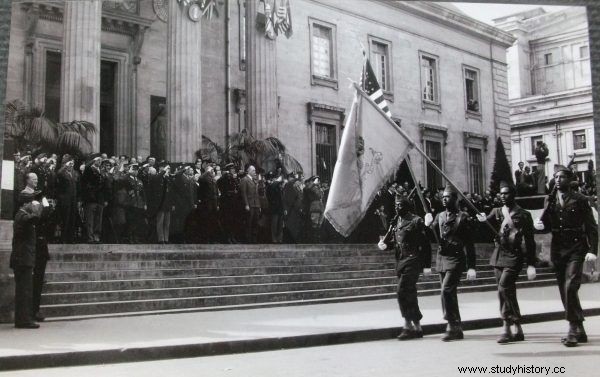
Victory parade in front of the Palace of Justice in Reims, May 8, 1945 (photo from the collection of the Musée de la Reddition, CC BY-SA 4.0).
The act of unconditional surrender of the Third Reich was signed May 7, 1945 at 2.41 a.m. in Reims, France, where the High Command of the Allied Expeditionary Forces, headed by American General Dwight Eisenhower, was located.
The document was signed by the Chief of the Wehrmacht Operational Staff, General Alfred Jodl, Eisenhower's representative, General Walter Bedell Smith, and General Ivan Suslov, a representative of the Soviet command. The capitulation was to take effect the next day, but the ceasefire went into effect on May 7th.
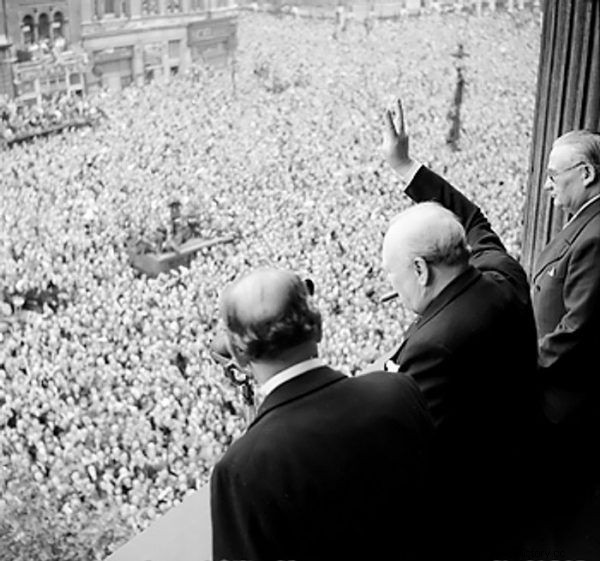
Winston Churchill greets the crowds from one of the government buildings on Whitehall Street (Photo:Public Domain).
Winston Churchill informed his compatriots about the German surrender in a radio speech on May 8, but did not fail to recall that the war was not over yet:
We can allow ourselves a short time of joy, but do not forget for a moment about the hardships and efforts that are still ahead of us . Japan, so treacherous and greedy, remains untamed. The wounds it has inflicted on Britain, the United States and others, and its hideous atrocities, call for justice and punishment. Now we must use all our forces and resources to complete the task, both at home and abroad. Come on, britain! Long live freedom! God save the king!
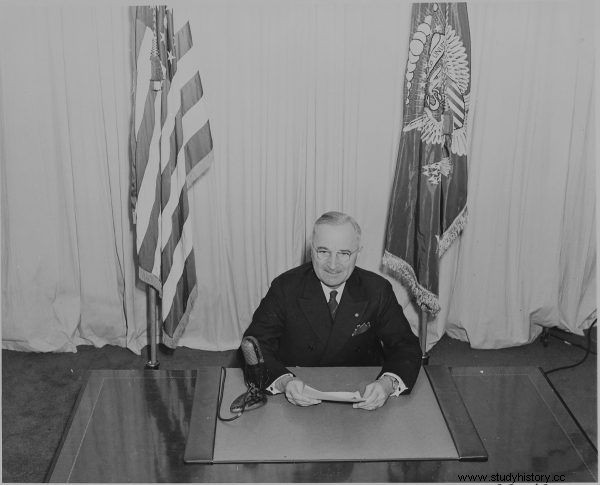
President Harry S. Truman announces the end of World War II in Europe (photo:National Archives and Records Administration, public domain).
Of course, a similar speech was made by US President Harry Truman:
General Eisenhower informed me that German troops surrendered to the United Nations. Flags of freedom fly over all of Europe. (...) Our joy is suppressed and limited by the overwhelming awareness of the terrible price we paid to get rid of Hitler's world and his wicked gang. Let us not forget, dear compatriots, the sorrow and pain that so many of our neighbors live today. Neighbors who sacrificed what they had most precious to save our freedom.
This article has more than one page. Please select another one below to continue reading.Attention! You are not on the first page of the article. If you want to read from the beginning click here.
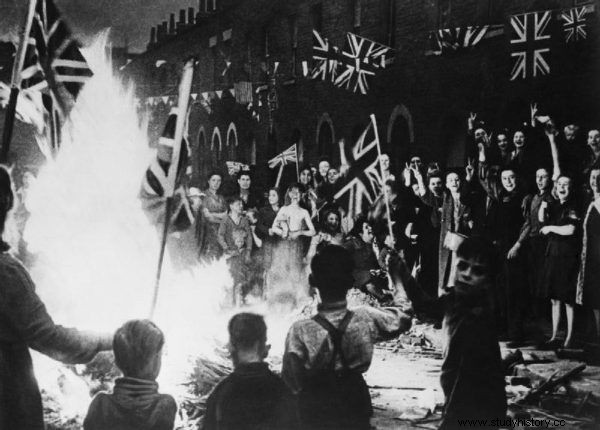
A bonfire in the street of a British city on the night of May 8-9, 1945 (photo:Imperial War Museum, public domain).
Despite Winston Churchill's mood-toning words, the joy at the end of the war in Europe was sometimes very spontaneous and the celebrations in the city streets stretched to the night. In at least one case, however, the news of victory unexpectedly turned into something far worse than burning fires and singing loudly. In the Canadian Halifax, from where Atlantic convoys set off during the war, there were riots involving several thousand soldiers, sailors and civilians who plundered the city.
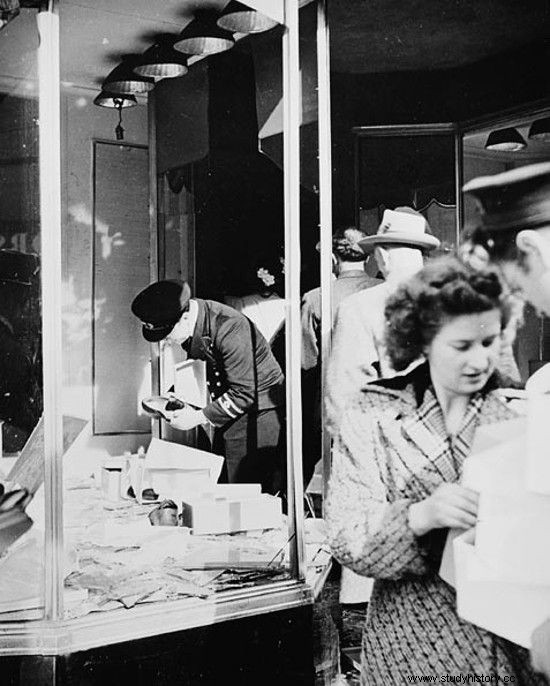
A shoe shop robbed during the riots in Halifax (photo:NCO Harvey, Library and Archives Canada, CC BY 2.0).
During the war, Halifax became, according to some, the most important port in the world. Because of this, the city's population doubled, but infrastructure development did not follow. Both former residents and military personnel experienced housing difficulties, shortage of goods in the store, long lines in front of theaters and other inconveniences.
When Admiral Leonard W. Murray allowed more than nine thousand of his sailors to disembark on May 7, it quickly became apparent that there was no room for them in bars, restaurants and hotels.
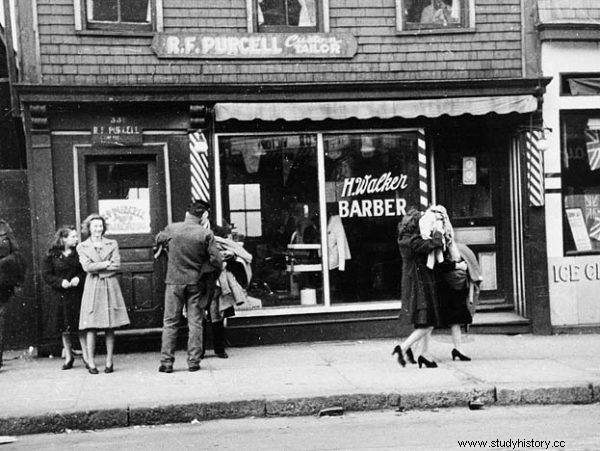
Broken windows in one of the barbers' premises, Halifax May 8, 1945 (photo from the Library and Archives Canada, CC BY 2.0).
Thirsty for alcohol and the opportunity to relax after the war years, sailors and civilians set fire to the trams and police car, began to break windows and rob shops with alcohol and all other goods . Worse still, the naval command did not realize the situation in time and the next day allowed another 9.5 thousand sailors to disembark. So the story repeated itself on May 8 and it was only in the evening that the situation was brought under control.
As a result of the incidents, three people died (two due to alcohol poisoning, one was probably murdered), and 363 were arrested. 654 units were demolished to varying degrees and 207 were robbed. Tens of thousands of bottles of alcohol were stolen, and the total loss was estimated at $ 5 million, including the cost of replacing 2,624 panes.
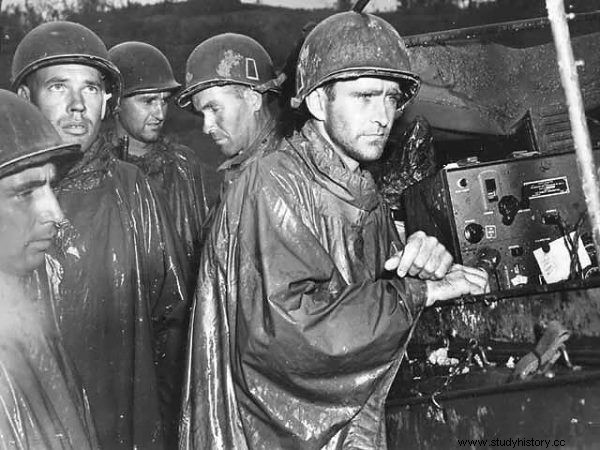
US troops in Okinawa listen to information over the radio about the end of the war in Europe, May 8, 1945 (Photo:U.S. military or Department of Defense, public domain).
The faces of these soldiers show that the victory over Hitler did not make them very happy. No wonder: they were right behind the front lines and returned to their battle stations a minute after listening to the broadcast . The bloody and extremely heavy fighting in Okinawa had been going on for more than a month and was far from over, which was not scheduled for June 22.
US troops celebrated their success on the European continent at midnight on May 8 by firing a single salvo from all ship and coastal artillery guns at Japanese positions.
This article has more than one page. Please select another one below to continue reading.Attention! You are not on the first page of the article. If you want to read from the beginning click here.
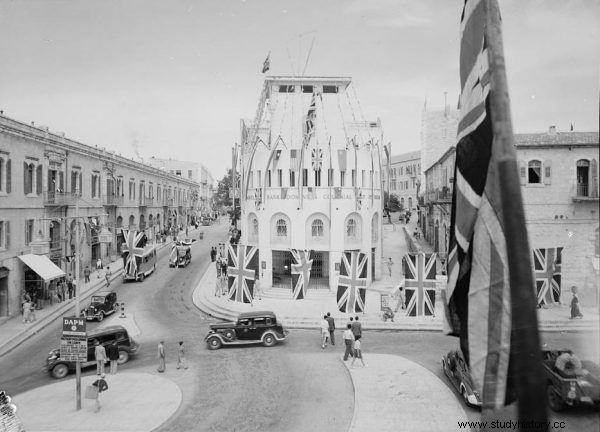
Streets of Jerusalem on May 8, 1945 (photo:Matson News Service, US Library of Congress collection, public domain).
The end of World War II was also celebrated in British-controlled Palestine but there were no cheering crowds in the streets. From the perspective of the inhabitants who did not experience the war directly, the local conflicts between the Arab and Jewish populations were much more important. The tension in the city and the entire region continued to increase.
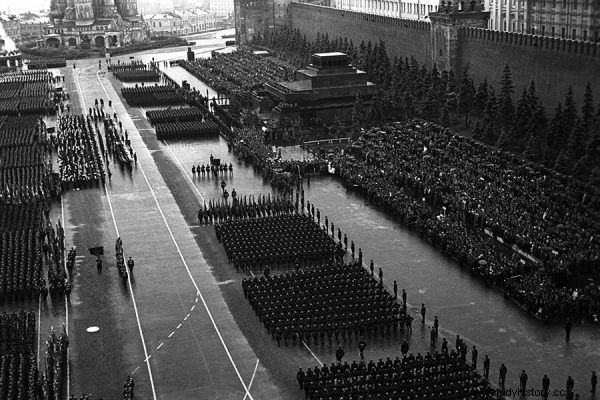
Victory parade on Red Square in Moscow, June 24, 1945 (photo:Ministry of Defense of the Russian Federation, Mil.ru, CC BY 4.0).
It was very important for the authorities of the victorious states that the success of the war, with so many losses, be properly honored. The celebrations could not end only with spontaneous outbursts of joy in the streets. On June 24 a great parade took place in Moscow with the participation of a small Polish branch . The parade lasted over two hours and was attended by 40,000 Red Army soldiers and 1,850 military vehicles and other equipment.
The parade was started by marshals Zhukov and Rokossovsky (the first on white, the second on a black horse), and one of its points was to throw the captured German banners at the foot of Lenin's mausoleum on which Stalin stood. It was the largest parade in the history of Red Square.
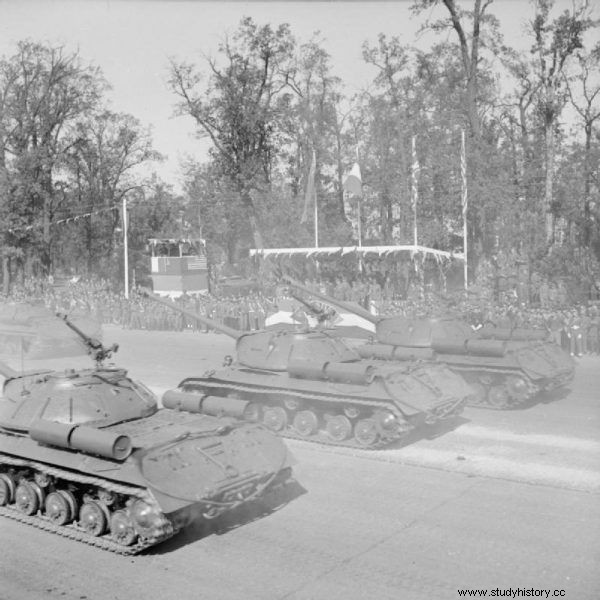
Soviet IS-3 tanks during a parade in the streets of Berlin, September 7, 1945 (photo J. Christie, Imperial War Museum collection, public domain).
It did not end with the Moscow celebrations. On July 21, 1945, the British organized their own parade in Berlin, and soon the Russians proposed a joint parade of the four winners (USSR, USA, Great Britain and France). Five thousand soldiers (including two thousand Soviet) and many military vehicles took part in it. The IS-3 heavy tanks were presented to the public for the first time.
The Western Allies downplayed the celebration a bit and gave it a relatively low profile (Eisenhower and Montgomery refused to attend), which can be considered an early sign of the impending Cold War .
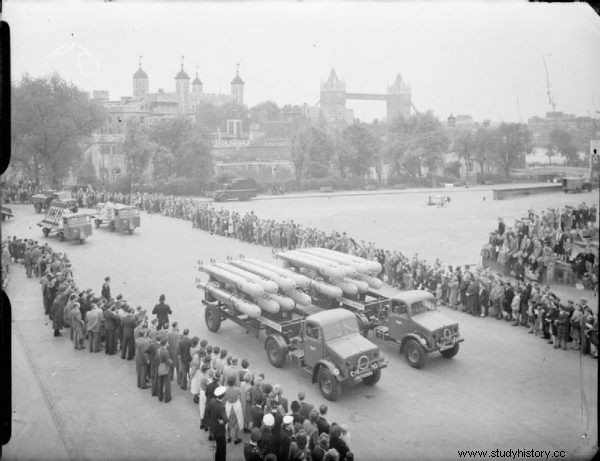
The London Victory Parade in Europe, June 8, 1946 (photo from the Imperial War Museums collection, public domain).
On June 8, 1946, a great parade of the allied forces took place in London. Of all the countries of the anti-Nazi coalition , only representatives of the Soviet Union, Yugoslavia and Poland were absent . It is not true, however, that the British ignored our contribution to the war against Germany.
The hosts of the ceremony issued an invitation to the Provisional Government of National Unity in Warsaw, recognized by the United Kingdom since July 1945. It was only the day before the parade that the British received a reply that the Polish delegation would not be coming. There was not enough time to organize the participation of the soldiers of the Polish Armed Forces in the West.
Inspiration:
The inspiration for the creation of the gallery was the book by Nicholas Best entitled Five days that shook the world (Horizon 2016 sign).
